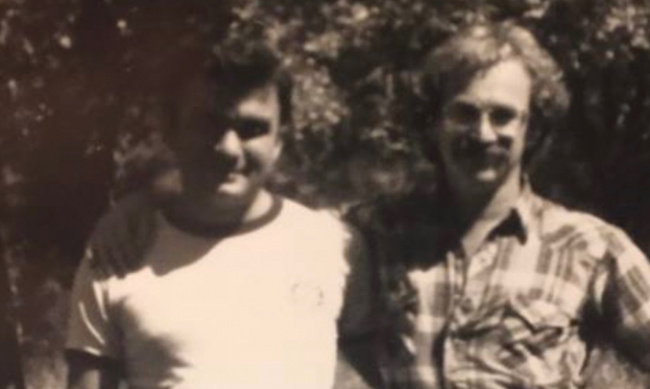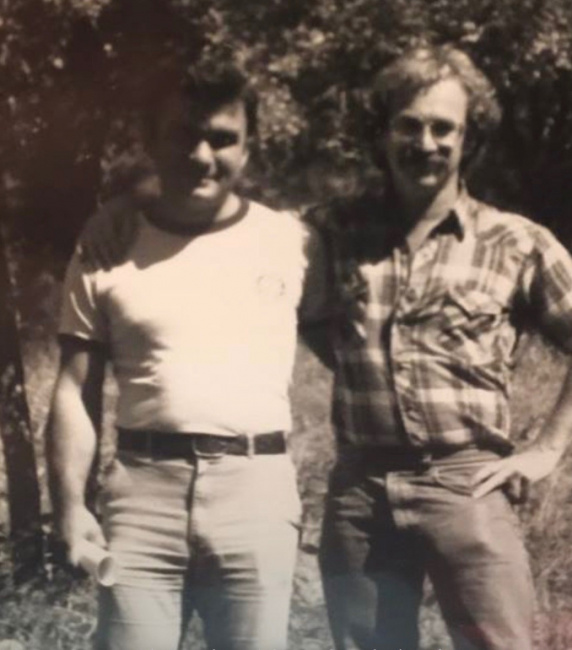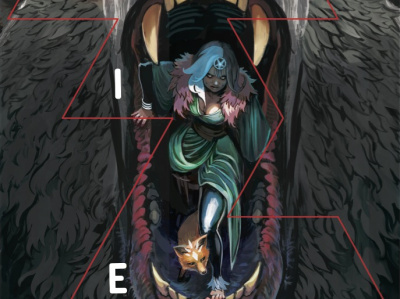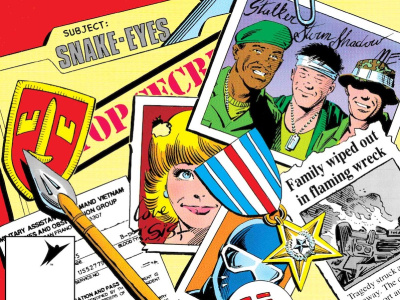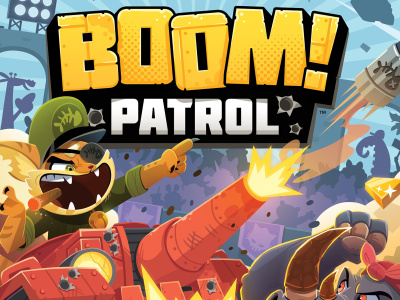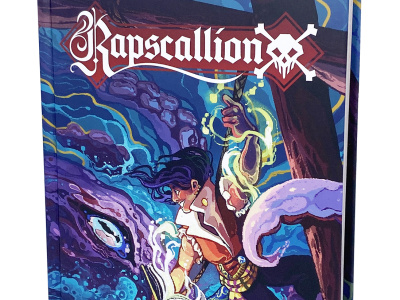Steve Geppi is the CEO of Diamond Comics Distributors and its parent company, Geppi Family Enterprises, a company that he grew from a tiny back-issue store to a major force in the comics industry. From 1993 to 2020, Diamond was the sole comic distributor to the Direct Market. For ICv2's Comics Direct Market 50th Anniversary celebration, historian Dan Gearino, author of Comic Shop: The Retail Mavericks Who Gave Us a New Geek Culture, talks to Geppi about his years in the business. Part 1 covers Geppi’s early days selling back issues in a tiny comic shop and how he moved from that to being a distributor. In Part 2, Geppi discusses the growth of Diamond and how it weathered the market bust of the 1990s. In Part 3, he looks at the realities of the Direct Market today and Diamond’s place in it.
For an overview article on the history of Diamond Comic Distributors, see "Origins, Dominance and Now a 'Gut Punch': The Story of Diamond."
This interview was conducted as part of ICv2’s Comics Direct Market 50th Anniversary celebration; for more, see "Comics Direct Market 50th Anniversary."
To watch a video of this interview, see "ICv2 Video Interview: Steve Geppi, Part 1."
Dan Gearino: Hi, I'm Dan Gearino, and I'm pleased to be here with Steve Geppi today. We're going to talk about some of the history of Diamond, the distributor that changed the face of the business of comics.
Steve, good to see you.
Steve Geppi: Good to see you too, Dan. Thanks for having me.
Are you in Baltimore right now?
Technically, it's a suburb of Baltimore, a little town called Reisterstown, but it's all Greater Baltimore metropolitan.
One of the good and bad things about having been around for so long, is we could probably spend all day on a good five‑year chunk here and there. I'm going to skip around a little bit but be roughly in chronological order. I wanted to start with the founding of the company. 1982, is that right?
That is correct. February 1st, 1982. This year, we're coming up on 42 years.
If I remember, you did not aspire to be a comics distributor. You were a retailer (see "Diamond Owner Steve Geppi Was Once a Retailer"). How did Steve Geppi, Retailer become Steve Geppi, Distributor?
After a brief stint working out of my house as a mail‑order/convention dealer, pretty much convention dealer really, I took the initiative, I guess everybody thought I was crazy, to quit my job at the post office, with a wife and two kids, to open what at the time in our area, as well as around the country, was an unprecedented comic book store, in the basement of a TV repair shop.
So I started in retail. That period, that was 1974, July 1st, to be exact, and it was during that period that other stores were starting to open up. I didn't carry new comics at first because nobody wanted to pay two months in advance or order in increments of 25, drop ship, and all the craziness.
Eventually, it became a necessity to keep people coming back to the store on a regular basis, so I could sell them back issues. Other stores were opening, and they couldn't reach the minimums. They were on the other side of town, old friends. They said, "Hey Steve, could I throw my order on your order so I can meet the minimums?" I said, "Sure, no problem. I don't really care about new comics as much as I do about the back issues." That triggered the quasi‑distribution under the auspices of Geppi's Comic World.
Eventually, things evolved where I got roped into distribution, because my distributor at the time, New Media/Irjax, had won a lawsuit to become a drop shippable distributor. He subsequently moved to Florida and began to call on all the big accounts and set them up as drop ships, of which I was one.
That's when I became a legitimate distributor, albeit still under the auspices of Geppi's Comic World. I know this is a long‑winded thing, but nonetheless, it evolved into, with his demise, I had now a bigger responsibility. I did a deal with him, I took over a couple of locations he had, and voila, I was a real full‑fledged distributor.
I separated the companies on February 1st, 1982, and went from Geppi's Comic World, a proprietorship, to Geppi's Comic World, Inc. and Diamond Comic Distributors, Inc.
The history of the comics business is filled with some interesting characters, some guys you'd like to hang out with, and some guys you really don't want to hang out with. These guys were an interesting bunch. What were your recollections of doing business with the New Media/Irjax guys?
My first relationship was with Irwin Schuster, who was a wheelchair user, and his son, Jackie. His brother Hal had his own business called New Media, and they were called Irjax, as in Irwin and Jackie. Then later, they combined forces and became New Media/Irjax.
My initial involvement was getting new comics, rather than from Phil Seuling, from Irjax because they were local. They were 40 miles away. They would literally drive them to me. That was a geographical advantage that they had at the time.
I started to be, effectively, a sub‑distributor of them. I had a handful of small guys, like I mentioned, who wanted to get comics but couldn't reach the minimums, and that evolved.
There's a story here that you might want to know (I don't know how many people know it; I know it) that involves a significant part of what happened to the Direct Market. New Media/Irjax (or, at the time, it was just Irjax, I believe), Irwin Schuster, filed a lawsuit against Marvel, DC, Warren, and a bunch of other publishers, because they wouldn't drop ship for him, whereas they would for Phil Seuling. He subsequently won that lawsuit, and a couple of things evolved from that.
Not only did he get to be able to drop ship and be able to compete with time of delivery, but also, it required at a minimum, Marvel (I'm not sure if it wasn't everybody), to publish trade terms for distributors, which kind of opened the door.
The irony of it is my oldest, oldest law firm, Lipshultz & Hone, were the ones who handled it. I have a firsthand knowledge of what was going on at that time. That was a door opener for distribution for the whole Direct Market. Hal and Irwin and Jackie, with all their faults, played a significant role and opened the door for a lot of other people.
Help me understand what these guys were like. You talked to other distributors. You talked to other people in the business at that time. They talked about how you go to meetings, and these were abrasive people. They'd start arguments. It almost came to fisticuffs. What were they like for you as close business associates?
Irwin was a nice old man, always nice to me. Jackie was a young son that was like, whatever his father said. He was semi‑pleasant, a little quirky. Hal was a real wild card. He was a boisterous personality. I believe he has passed. I know Irwin has. I think Jackie is still around.
Hal was a very combative person. There are legendary stories of the outbreaks at distributor meetings. You've probably heard a few of them. He wasn't everybody's favorite guy, to be honest. He wasn't, in my humble opinion, very trustworthy. He did a lot of things that I would never consider doing and pissed off a lot of people. That combative nature of his is what reaped his reputation, which isn't very good, sad to say.
Since you worked so closely with the New Media/Irjax guys, one of the things that I hear when I talk to retailers and other distributors who worked with you was, "This is a guy where, he tells he's going to do something, he does it." Was that how you are? Did you also see the New Media/Irjax guys tripping all over themselves?
No, it's inherently my nature. This sounds self‑serving, but I like to think I'm a fair person. I'm a reasonable person. Everything I did and still do to this day is based on what I truly believe in my heart. It doesn't mean I'm right all the time, but I do follow my heart and my gut.
It's an interesting thing to look back on that period now, with the 40 years of history behind us, and see how it turned out. Everybody's trying to make a buck. Nobody knew this business was going where it was going to go. Like I said, when I started out, it was strictly, for me, a back issue business. I quit my job at the post office, which I loved, because I was making more money on the weekends than I was at my job, selling old comics. Even though I loved that job and had a wife and two kids and a good, secure job, this was very attractive.
I was enthralled by it because I was also a collector. This was reliving my childhood to see all these old comics. Never did I realize, even when I opened the store without new comics, that I could even expect to make any money in the store. That was a base of operations to get ready for the conventions.
When you look back at the country (the world for that matter, but, particularly, the country) the Direct Market as we know it domestically, I was one of many, by osmosis, that were doing the same thing.
We all had a childhood where we loved comics. Everybody relates to the fact there was nowhere to go to buy back issues. If you found a comic two months old, you thought it was a big score, because newsstands took them off right away.
I found a little store not far from my neighborhood where the guy in 1959 (this is before my involvement with the Direct Market) was the first guy I ever ran into that charged more for old comics than new comics, because he knew kids would want them. He had his quarter box, his 50‑cent box. I was like a regular there every week with my two dollars or whatever I had, and that's what really turned me on it.
Of course I got away, had to quit school to support my mother. All the years I changed jobs and eventually I got the job at the post office, and I was all settled in, wife, kids, and a job. Along the way my nephew was reading a comic book on vacation and sent me on a nostalgic journey that flashed me back to the point where, "Hey, when I get back, I'm going to ask people in the district, 'anybody got any old comics?'"
I never in my wildest imagination thought they would be worth what they were worth. Maybe in hindsight, I remember the guy charging a quarter for these things, but I wasn't in any way, shape, or form thinking about it from a making money standpoint. I just strictly wanted them to get the ones I had.
I made a few scores and eventually discovered I had things I didn't want, things I had duplicates of, so I started selling them, and I found out about these conventions. In fact, I called Phil Seuling, I called DC and Marvel, because that's the kind of guy I am. I said, "Hey, where do I get old comics?" They introduced me to the July 4th Comic Art Convention in New York. I wish I could relive it. It was so fun at the time to just experience the newness every time you discovered something. Now, not to be complacent, because I love it still, I think I've seen everything there is to see in the way of comics that I've handled. I still get a charge out of it, particularly if they're high-grade condition.
Back then you got the Comic Book Price Guide, which was in its third edition in that year. Ironically, I own it today. That little book was a revelation. You could find out what did exist. It was amazing to know who the first appearances were, where to look, and what to get. That made it fun.
When you look back at your entire career, is that the period you remember the most fondly?
That's my favorite because, don't get me wrong, it's fun to be successful and have a big distribution company and all the other companies that I've been able to do. They all have the same measure of love from me, but back when it was so fresh and so new and then now finding out later, that's what makes it great. I have an expression that says "The only thing better than new news is old news." The reason is because when you're reading old news, you have the benefit of knowing what happened since, which you don't have at the time when it's new.
Now when I reflect back on that period, and I think of all the things that have happened, I get a whole new enjoyment out of seeing the seeds that were planted, the little things that didn't seem like a big deal at the time that mushroomed and became this wonderful business that we have now. That is wonderful to recognize that the whole world sees it.
Movies are dominated by comic characters. Pop culture, schools accept them. It's been a great ride. When I think back at that period, I think that's the incubation period that would be fun to live over again.
In 1982, you acquired some of the assets from New Media/Irjax. Precisely what did you acquire from them?
What really happened? I didn't in any way, shape, or form purchase any entity called New Media/Irjax. Similar to many acquisitions I've made in the past, typically, what you do is you buy assets and liabilities. What happened was I was the last vestige of his cash flow. Everybody was defecting and leaving. Ironically, his best paying account was me; because he needed me so badly, he started to treat me poorly when I was starting to pull away. I had been accepted to go direct to Marvel, so that was the last vestige of him.
I was invited down to my first Marvel meeting in Florida. Since I was there, I went over to Largo where his offices were to meet the people I’d been dealing with. It was that time that I ended up negotiating a deal with him. He was going to get out of distribution. He was going to go into publishing, which he did for a short period of time, and I was to take over what he had started. He had a distribution center in Cambridge, upstairs with an elevator lift kind of a thing, it was very crude, called Solar Spice and Liquors. He had a crazy name from some science fiction paperback. In Florida he had Fantastic Kingdom, I think it was called, in Largo.
Then he had sub-distributors. He had me in Baltimore, he had Mike Ferraro, or Fat Jacks, in Philadelphia, and he had Steve [actually Dave-ed.] Barrington, I think, in Northeast Ohio News, NEON. When I cut this deal with him, the thought process was this, I knew he was going to get out of business, and that was going to affect me. I was going to get caught in the trap, if you will, with due respects to Elvis.
I was going to get caught there, and I couldn't afford to get stopped. I had eight weeks to hope he'd stay in business long enough before my books started coming directly from Marvel. I had already made an arrangement with my good friend, Walter Wang at Comics Unlimited—it was then called F&W Enterprises—to cover me on DCs.
Lo and behold, one week shy of it happening, he went south. They put him on hold. Now, here's the interesting thing about being on hold. Just because he was on hold didn't mean the publishers could then release the books to me. Because for all they knew, he could pay them next week, and despite the fact he wasn't paying, they said they needed his "permission" to release them to me. So he had what I called the broken corral with the horses in it and a broken gate. I can get the horses out and try to get my share, but there were other distributors. But if I could buy the corral while the gate was broken and fix the gate, I might be able to keep them all because they would get two months of service before they had a choice. Pretty much that's what happened. I took over, they released the books to me, I was able to service all the accounts that were on his agenda, his list, and subsequently keep them.
That meant, overnight I went from a sub-distributor in Baltimore to having a warehouse, call it a quasi-warehouse, in Largo, one in Boston, a big sub-distributor in Philadelphia. The only piece that I didn't get was Northeast Ohio News. The irony of that is that became the nucleus of Capital City Distribution, who subsequently became my biggest competitor, albeit we were good friends.
When you have acquired these assets, do you then bring in a distribution professional? This is a different business than the one you'd been in.
It was really a bootstrap kind of mentality. Remember in those days it was almost strictly comics. We didn't have anything that wasn't shaped like a comic book, so packing and shipping was a hell of a lot easier than today, when you’ve got posters and toys and every kind of paraphernalia and garments.
We did it, like I say, from bootstraps up. I literally put the order form together. I literally compiled the orders. I literally filled the orders. I had help. It was quite an education and fun to see the fulfillment. Because it was funny, as you were putting the numbers on paper, when you total up your order for X-Men, "I need 800 X-Men." Then one day it's 5,000 X-Men. There's a difference between seeing it on paper and watching them come in the door, when all of a sudden there's truckloads now instead of small van loads, and it was like, "Whoa!" You're getting all excited as you're getting the orders, but you don't realize till they start showing up just how massive distribution can become when volume gets involved.
That led to us opening multiple warehouses over a period of time. I think in 1984 I opened four or five different cities. It was in 1988 when I was in Chicago with Bud Plant and Gary Colabuono. We had all been called as witnesses in a lawsuit that First Comics had filed against some of the printers and publishers about disproportionate treatment on pricing.
I took the stand, was on there the whole day. It was funny. Mike Cherry, I think, was the name of the lawyer for First, he told Bud and he told (this sounds egotistical) he told Bud and he told Gary they were not going to need them anymore because I did such a good job with it. I was just being honest. He sent me and Bud out to dinner.
Remember, I had built my little empire from the middle of the country east, and here was Bud on the West Coast with seven locations. We spent a three‑hour, magnificent dinner and became really good friends, even more so then. It was at that dinner that I started talking to Bud about purchasing Bud Plant Inc. because I was the second‑largest distributor and he was the third. Capital was first.
We worked out a deal, and that day, July 16th, I believe, 1988, that day we became the world's largest distributor of English language comics ever coast to coast. It happened very quick if you think about it. From 1982 to '88. In six years, I go from handling a couple of people in the back of a room with shipping the books myself, to having blanketed the country. Very fortunate to have been in that position.
Do you remember the restaurant where you guys had that dinner?
Oh, it was called Nick's Fish Market, I want to say. I still, to this day, want to go back there. Mike Cherry had really set us up. He called the maître d'. I think we sat there for an hour just getting drinks and these fabulous hor d'oeuvres, one after the other, kept coming out, and we didn't even order them. He just set it up. Then we had a fabulous steak dinner. We were there like three and a half hours. I don't know if it's still open, but I know it was Nick's. I'm pretty sure it said Nick's Fish Market, but I'm not 100 percent. It was wonderful.
I always loved Bud because he was such down‑to‑earth guy. Bud never wanted to be in distribution. His slogan, he said, "but no comics." That was on the Bud Plant, Inc., "but no comics." He kind of went kicking and screaming into distribution. He would tell you that himself.
Bud was up there in Grass Valley. He had a really nice mail‑order business that he developed and had some great people working for him. They were so loyal and formed one hell of a company. Armed with the fact that I knew Bud wasn't really enamored with this thing growing out more than he wanted to be, we came to an agreement to work out a deal. It was very amicable, very easy. I can't remember a more pleasant deal. When they did that book, back in the day, DC, called Fifty Who Made DC Great, one of them was Bud Plant, and he rightfully deserved to be in there because he was an innovator at the time.
A lot of other things came from that area, Berkeley, the stores up there, Comics and Comix, which he was part of. All those things spawned a great number of people who either then or even now still are part of the industry.
So you're growing from this tiny, essentially one person plus just a few others, business in '82. You become, very quickly, the biggest in the country in this business. Were there any key hires? Can you name maybe one or two that just really allowed you to be able to handle that growth?
Yeah. I'll give it to you on two levels. One is not on an executive level. One is on a loyalty level. I had a couple guys that worked for me. There was a young guy named Mark Herr. He was 13 years old. Used to bring in stacks of one‑dollar bills from his paper route to buy comics. He worked for me for 29 years. Another guy (may he rest in peace): John Curtis, who was the gofer, if you will, and another guy named Gary Burnett. These three guys, who are not with me anymore, but these three guys, you just felt like they believed in you.
Later, when things became real and my bank started to say, "If you're going to make loans, you've got to have a controller, a CFO, whatever, and a lot of bank restrictions," I hired Chuck Parker, who is with me to this day after 38 years or whatever, how many it is, I'm not even sure. He became the Controller, subsequently became Vice President and now President of Diamond Comic Distributors, along with Larry Swanson who is a CFO. Both of them are good friends with each other. They worked for a local accounting firm for many, many years. Then they subsequently came to work for me. They've been the driving force behind running the trains, if you will, for Diamond for many, many decades.
There's so many people that, over the years, have come, have gone. Some have come and gone and come back. Some have passed away. Some have gone on to other companies and are still important people at other companies. I think of Filip Sablik over at BOOM! Wonderful employee. He's a guy that really did a lot for my company. I was happy to see him be such an important person now, not only for BOOM! but for the industry.
I think that's what Bud feels too. If you go back to Bud and you think of all the people that started in Bud's operation, Comics and Comix, you'll find some pretty special people in the industry came from those places. That was a little of my piece of it too.
Click here for Part 2.



